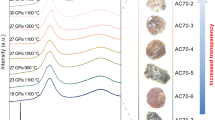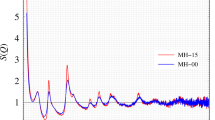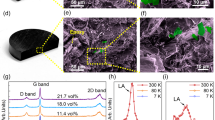Abstract
IT is well known that, on heating to temperatures between 1,700° and 3,000° C, some carbons show a continuous and homogeneous development of the three-dimensional structure of graphite, whereas in others the structure does not develop beyond the stage of small regions of ‘turbostratic’1 order. It has been shown2 that graphitization is impeded when there is strong cross-linking between the small ordered regions (which are formed in all carbons at low temperatures), and also when there is random orientation between neighbouring ordered regions. Of these two factors, the latter is the more fundamental. At sufficiently high temperatures, cross-linking is always destroyed2; but, where random orientation exists, no homogeneous graphitization occurs.
This is a preview of subscription content, access via your institution
Access options
Subscribe to this journal
Receive 51 print issues and online access
$199.00 per year
only $3.90 per issue
Buy this article
- Purchase on SpringerLink
- Instant access to the full article PDF.
USD 39.95
Prices may be subject to local taxes which are calculated during checkout
Similar content being viewed by others
References
Biscoe, J., and Warren, B. E., J. App. Phys., 13, 364 (1942).
Franklin, R. E., Proc. Roy. Soc., A, 209, 196 (1951).
Franklin, R. E., Acta Cryst., 4, 253 (1951).
Author information
Authors and Affiliations
Rights and permissions
About this article
Cite this article
FRANKLIN, R. Homogeneous and Heterogeneous Graphitization of Carbon. Nature 177, 239 (1956). https://doi.org/10.1038/177239a0
Issue date:
DOI: https://doi.org/10.1038/177239a0



